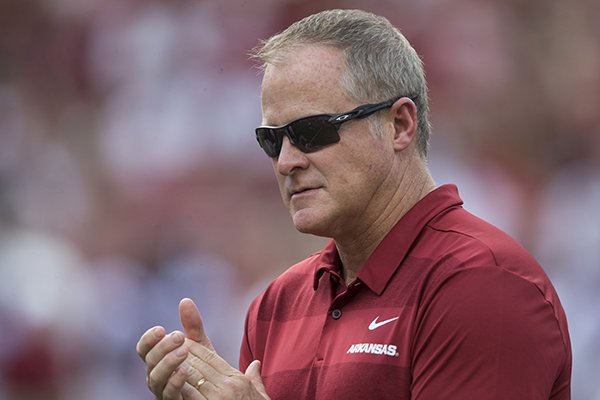FAYETTEVILLE -- University of Arkansas Athletic Director Hunter Yurachek has two sons who are part of the Razorbacks' football program.
Jake Yurachek is a redshirt sophomore linebacker who played in four games on special teams last season, and Ryan Yurachek is a graduate assistant coach.
So when Hunter Yurachek reached out recently to parents of Arkansas athletes about coronavirus safety measures being put in place for their sons and daughters returning to campus this summer, he could personally relate to the mothers and fathers.
"I deal with their mother on a regular basis asking questions about how we're appropriately preparing the facilities for her one son to go to work and for her other son to start working out again," Yurachek said of his wife, Jennifer, during a Zoom call with media members Wednesday. "She really could care less about how I'm doing at the Broyles Center and how sanitized that is."
Yurachek was joking about his wife's lack of concern for his own well-being, but he's serious about safety precautions to make sure the Razorbacks and their parents are comfortable about voluntary workouts at UA facilities starting with the first of four phases for returning to campus June 8.
"I'm not going to allow any of our student-athletes or staff to return to campus without it being safe," he said.
Yurachek said the athletic department sent a question-and-answer document to the parents of all 465 UA athletes last week, then had two Zoom calls with parents to answer additional questions.
"We probably had 150 parents that participated in those Zoom calls, and I can tell you with great assurance that we didn't get any questions about returning their student-athletes to our campus," Yurachek said. "I think the parents of the majority of our student-athlete have great confidence in returning their sons and daughters to our campus."
Yurachek was asked whether he was surprised no parents said they wanted to withhold their children from returning.
"I think if they're like me and they've had their children living at home for the past seven or eight weeks, nine weeks, they're ready to have them out of the house," Yurachek said. "I say that with some levity.
"But what we've tried to do is create a level of confidence in our plan [for] parents and student-athletes and our staff as we return to our work environments on campus."
Yurachek said he told the parents it's inevitable there will be an athlete test positive for covid-19.
"We can't eliminate the risk totally, but we can mitigate and minimize the risk and the exposure," he said. "We have a plan to handle that. And all we can do is mitigate their risk to covid-19."
Yurachek said if an athlete tests positive, the protocol calls for that person to be quarantined.
"There's a big discussion on the contact tracing about what is close contact," he said. "With the workout groups and the masks we're wearing, that's going to take out a lot of individuals."
Yurachek said some of the rules about what constitutes close contact are vague.
"But I would foresee the roommates of that athlete, for sure, being quarantined along with them," he said.
Yurachek said preventing the spread of the coronavirus also will be up to the athletes taking it upon themselves to be responsible by practicing social distancing and wearing masks. That will be a challenge, he said, but the athletes should be motivated by sports being shut down for more than two months.
"I don't think any of those young men and women want to go through another period where they're not able to do what they love, and that's to practice and play their sport," Yurachek said. "We're going to have some educational sessions with them. The social-distancing piece, it can't just be where we have a watchful eye on them in our campus venues. They've got to take some responsibility as young adults outside of our venues and when they go back to their apartments and their social settings.
"That's an age that we all were at where you feel somewhat invincible when you're 18 to 22 and 23. But they've got to take some responsibility not just for themselves but for the people that they are around."
Sports on 05/29/2020

